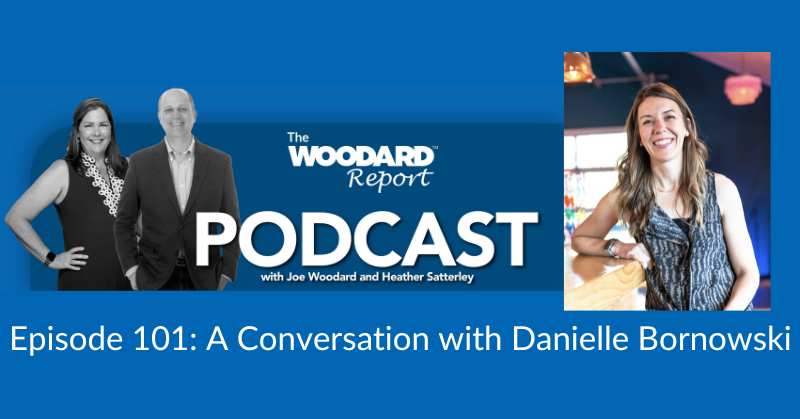Marketing can feel like a daunting task for many accountants and small business owners, particularly for those who consider themselves introverted or shy about promoting their services. The fear of sounding “slimy” or overly salesy often keeps professionals from fully embracing the potential of marketing to grow their businesses. In a recent episode of The Woodard Report podcast, Danielle Bornowski, CEO of DQB Strategies, shared valuable insights and actionable tips for overcoming these barriers and creating a marketing strategy that feels authentic, approachable and effective.
Converting referrals to sales
Referrals are often the lifeblood of accounting and bookkeeping practices. As Heather Satterley pointed out, many firms rely on referrals for a significant portion of their business. However, when a firm is in growth mode, relying solely on referrals may not be sufficient. Bornowski emphasized the importance of reigniting referral networks and provided advice on how to leverage satisfied clients as brand ambassadors.
A key takeaway was the need for directness. While it may feel uncomfortable to ask clients for referrals, Bornowski explained that clarity and specificity are essential. Instead of a vague, “Do you know anyone who needs a bookkeeper?” she recommended framing the ask with criteria such as, “Who do you know that runs a small business and struggles with financial organization?” This approach not only prompts clients to think more critically but also aligns their recommendations with your ideal client profile.
Additionally, Bornowski highlighted the value of storytelling. When a current or past client shares a genuine story about how your services solved a problem or improved their business, it resonates more deeply with potential customers than self-promotion ever could. These stories serve as testimonials that can drive trust and conversion.
Making the ask for referrals
Starting the conversation about referrals can feel daunting. Bornowski suggested looking for natural opportunities to ask, such as when a client provides positive feedback. A simple response like, “Thank you! I’m so glad we could help. If you know anyone else who might benefit from our services, I’d greatly appreciate the referral,” is often enough to get the ball rolling.
For those hesitant to ask in person, there are other options. Adding a referral request to your email signature or including a call-to-action in end-of-month reports can make the process seamless. Persistence is key, too—following up with clients who express interest in providing a referral ensures they don’t forget.
Using testimonials strategically
Once you’ve gathered testimonials, it’s crucial to use them effectively. Bornowski shared multiple ways to integrate client reviews into your marketing efforts:
1. Website: Display testimonials on your homepage or in a scrolling banner to build trust with visitors.
2. Social media: Share quotes or video testimonials on platforms like LinkedIn and Facebook. Video, in particular, is a powerful medium for connecting with audiences.
3. Sales conversations: Reference relevant testimonials when speaking with prospective clients to demonstrate your value.
Additionally, testimonials can provide insight into your ideal clients. By analyzing the language and themes in positive reviews, you can refine your marketing messages to better resonate with your target audience.
Handling negative reviews
Reviews, of course, aren't always positive. No matter how good and professional a business is, it's impossible to please everyone. But Bornowski, naturally, is prepared for this.
She stressed the importance of responding promptly, professionally and emotionally neutral. A well-crafted response demonstrates your commitment to quality and customer service, often mitigating the damage caused by the review itself.
Tell the client it's always your goal to get things right, she said, and let them know you're available if they'd like to further discuss the issue they had with your work. Maybe this leads them to edit their review on Google. Problem solved.
If a negative review is inaccurate or unfair, business owners can flag it for removal on platforms like Google. However, the best course of action is often to address the reviewer directly, acknowledge their concerns, and offer to resolve the issue. This not only shows integrity but also reassures potential clients that you are proactive and solutions-oriented.
Building an online presence
In today’s digital age, an online presence is essential for any business. More than 80% of consumers research a business online before making a purchase decision, and businesses that lack a digital footprint risk being overlooked. Bornowski recommended starting small and growing your online presence over time.
1. Google business profile: A must-have for local visibility and credibility.
2. Website: Even a simple, SEO-optimized one-pager can be effective for small businesses.
3. Social media: Choose one platform to focus on initially and post consistently, even if it’s just once a week.
Bornowski cautioned against over-investing in branding elements like logos and business cards before having a clear strategy to drive traffic and engagement. Instead, she advised focusing on communicating your problem-solving capabilities, the solutions you offer, and how clients can get started with your services.
For firms just starting their marketing journey, Bornowski emphasized the importance of clarity. Knowing who your ideal client is and what you offer allows you to focus your efforts where they will have the greatest impact. She encouraged small business owners to leverage their existing networks, including past clients, local communities, and even casual acquaintances, to spread the word about their services.
As businesses grow, marketing efforts can expand to include more sophisticated tactics like SEO, paid advertising, and email campaigns. But the foundation should always be a deep understanding of your audience and the problems you’re solving for them.
Listen to the full conversation
For those ready to take the next step, Bornowski offers personalized roadmaps that help businesses identify priorities, capitalize on low-hanging fruit, and build a sustainable marketing plan.
Listen to the full episode here or check out Bornowski's LinkedIn profile.
Follow The Woodard Report Podcast on your favorite podcast platform.
Sponsored by Truewind
This episode is sponsored by Truewind, a next-generation, AI-powered accounting platform designed to optimize monthly closes, automate tasks, and uphold top data security standards. Learn more at Woodard.com/podcast.
.png?width=150&height=63&name=TWRlogo-regmark_blueblack%20(1).png)
.png)










Do you have questions about this article? Email us and let us know > info@woodard.com
Comments: